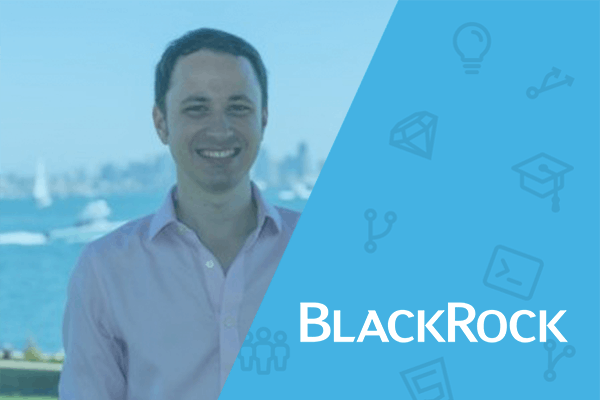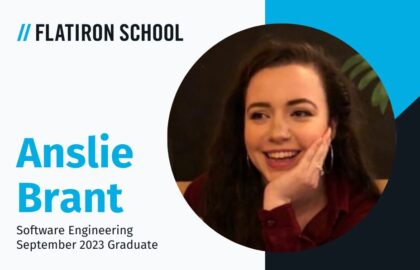In our Beyond the Bootcamp series, we chat with members of our alumni community about their post-Flatiron career journeys. What new roles have they taken on? How did they get to where they are now? What advice do they have for new programmers following in their footsteps?
Before Flatiron School, Chris Guthrie worked as an Equity Analyst, but he wasn’t satisfied with the “volatile” life of a stock trader. He came to Flatiron School to turn his programming hobby into a programming career. In the years since graduating, he’s worked his way up to becoming Vice President and Senior Engineer at BlackRock, the global investment management company. Read on to learn how he made that transition and his advice for new programmers.
Learning to Code
While attending college, Chris embraced the marketplace, trading stocks to support himself through college. Two days after graduating, Chris moved to New York City to find a job as a stock trader and ended up working for a proprietary trading firm for six years. “It was a very interesting experience,” Chris says. “I learned a ton about how our markets work, but, ultimately I decided that wasn’t the way I wanted to spend my whole life because it was a very volatile life – there’ll be some days where you would do very well and some days where you would do quite the opposite. It was a tough way to live.”
To some degree, Chris had been surrounded by code his whole life – his father was a developer. “I think I was like 3 or 4 years old,” Chris remembers. “My dad turned on his Radio Shack TRS80 and showed me how to program some stuff in BASIC. So from a very early age I was around code but not really actively coding. I just kind of knew it existed.” Fast forward to college, Chris began making small trading algorithms “so when I actually went to class, I could turn on a switch and the computer would trade for me.” But Chris never went beyond being a hobbyist until a good friend of his introduced him to Flatiron School.
Takeaway #1 – Chris’ advice for those curious about programming: “If you ever want to learn to code, you can learn to code that very moment. That’s just a fact of life with all the resources that are online right now. It’s really incredible: you can go to a variety of different sites and just code interactively immediately, learn any language you really want to. So my advice for people who want to learn how to code is you should go learn how to code. It’s really that simple. If you have even the smallest bit of ambition you can get started immediately and if you have an even a greater interest then go check out a place like Flatiron School.”
The Flatiron School Experience
Flatiron School caught Chris’s attention after he saw how his friend Tiffany Peon (profiled earlier in this blog series) transformed her own career. “I was astounded and blown away how quickly that was able to occur,” he says. “It was very clear the demand for developers in the market place is just explosive, and so deciding that I really couldn’t pass up that kind of value – a three month investment; the return on that is just tremendous. The amount of stuff you learn in a short amount time is just incredible.”
His favorite part of the experience was how Flatiron “didn’t mess around. On the very first day, they sat us all down and told us we had to push code in like two hours. We all had our five minutes of panic before we kind of settled down and tried to reach back to the pre-work we had done to figure out how to actually use Git, how to actually come up with a few lines or HTML, and so on.” Chris liked that the majority of the Flatiron program was actual coding, which is “really the only way you can learn how to code – by making mistakes, making them often, and figuring out the right way to do things.”
Takeaway #2 – Chris’s advice for coding students: Learning Ruby and JavaScript at Flatiron School is a powerful foundation for your software engineering career, but don’t be afraid to keep learning more languages: “Once you know one language or once you know one framework, it’s just documentation and syntax to go onto another one. Make sure you have an open mind about what people are programming in, make sure you have an open mind about the development community at large and trends that are happening.”
Life at BlackRock
Chris started at BlackRock as a developer, primarily repairing legacy code and deploying emergency bug fixes. But he quickly began to stand out – early on, he taught himself Angular on his own and rewrote one of BlackRock’s legacy apps in the framework. “Looking back at the code, it’s hilariously awful,” Chris says, “but any project that you work on, six months later you’re going to point at it and say how bad it really is. But you have to start somewhere. The cool thing was that I was able to do it and it impressed a lot of people. That kind of cemented my reputation of someone who can figure something out, especially on their website where BlackRock was seriously ramping up.”
After working his way up at BlackRock, he was recently promoted to Vice President and he’s had the opportunity to work on a truly impactful project. “The biggest project that I’m working on right now has to do with really safeguarding the retirement accounts and investment accounts of people all over the world and especially in America,” Chris says. “It’s really cool that I’m part of potentially helping somebody’s grandmother, or someone’s dad from getting taken advantage of from an unscrupulous financial advisor. I’m building web tools that empower executives and other people at firms to make sure that the clients, whose money they manage, are not being take advantage of and have the correct portfolio allocation in their accounts.”
Takeaway #3 – To get that first software engineer job, “you’ve got to stand out a little bit,” says Chris. “So I really would suggest that if you’re going out to interviews, be over-prepared. Have your apps available and hosted somewhere, so once you talked about them you can say, ‘Hey, do you want to check out my apps?’ and you hand them your laptop. Every interview is going to be different – you might have a whiteboard session, you might have some variety of technical interview – but having something that you’ve actually done ready for an interviewer to see is very valuable thing. I do a lot of interviews now, and you’d be surprised at how many people who say ‘I’ve done all these apps’ and I ask them ‘Okay, I have a computer right here, why don’t you show me?’ and they’re like, ‘Well it’s not working’ or ‘It’s not up’ or all this stuff. Well, why are you here? Show me something cool!”
What’s next for Chris?
Chris admits it’s hard to forecast years out considering the speed with which technology develops. Even the project he’s working on now is “going to be in a very different place a year from now, and so we’ll have to see what happens,” he says. “But it’s tremendously exciting to work on, and I’m very proud of the work I’m doing and the work my team is doing to protect people out there in the world.”
Read more about our alumni salary, language, and job trends in our recent Beyond the Bootcamp survey.




